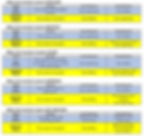Witness Preparation: Why do Witnesses Struggle to Tell the Truth?
- Jeff Dougherty, M.S.
- Jan 4, 2019
- 3 min read
Updated: Oct 7, 2024

If you are a trial attorney, have you ever wondered why your witnesses sometimes do the following in depositions or under cross-examination:
Agree with things that aren’t true.
Volunteer information when you instructed them not to.
Agree with something you know they don't believe.
Insist on explaining their answers when no explanation is needed.
Agree with the opposing lawyer’s characterizations of what the facts mean.
Agree they should have done something different.
Argue with opposing counsel.
Act defensive.
Acquiesce so easily.
Look “guilty.”
Admit they were negligent when they really weren't.
Keep second-guessing or changing their answers, etc...
Why do Witnesses do These Things?
Everyone has developed a set of communication skills they use in professional, social, and interpersonal situations. These skills follow basic communication "rules," which we learn to apply to a whole variety of communication settings. Part of these communication rules deals with knowing how to interpret and understand communication cues sent to us by the receiver of our message. This also means knowing how to adapt our response depending on the communication setting. Some examples of cues we get from the receiver of our messages include: tone of voice, facial expressions, body language, and emotional responses.
The problem is that no one has developed a set of communication skills and rules that work in the litigation setting – particularly under adverse questioning. So, what happens to the witness with no knowledge of litigation cues? He or she borrows the communication skills and rules that work for them professionally, socially, and personally and attempts to apply them to the litigation setting, and they often fail miserably. Why? Because cues and rules of communication in the litigation setting are not only different than they are in the real world, they often mean the exact opposite of what one would reasonably expect, and thus they require a counter-intuitive response.
How It Works
The tables below present some examples of types of communication cues we might encounter during the course of an interpersonal communication interaction or that a witness might encounter while under cross-examination. Note how the meaning of the same cues and the appropriate responses to those cues differ dramatically depending on whether the interactions occur in the real world or the litigation world.


It’s easy to see how even the most sophisticated witness can unwittingly play in to the hands of opposing counsel, simply by attempting to communicate like a normal and rational human being.
What Can be Done?
Before witnesses will be able to understand why the communication cues in litigation aren’t what they seem, they need understand how the communication objectives in the litigation world differ from any other environment they’ve ever experienced. This is a vital step to effective witness preparation and one that is often underappreciated and sometimes skipped completely.
For example, if not taught otherwise, witnesses will assume that the more information they provide to opposing counsel the better. They will think: “If I can just explain things more clearly, I can convince this lawyer of “X” and he will get it and move on.” The problem with this thinking is that witnesses don’t intuitively realize that the opposing lawyer will advocate for his client no matter what the witness says. So, what might be a perfect answer to any given question will never “satisfy” the opposing lawyer, he will never change his mind, and explanations will only make things worse. Compounding this misapprehension is the fact that many of the cues witnesses receive from opposing counsel suggest the opposite (more information will help), resulting in a futile attempt to clear up the seeming miscommunication with more and lengthier explanations -- making matters worse.
Conclusion
The good news is that witnesses can be taught how to interpret communication cues from opposing counsel and to communicate effectively in the litigation world. However, because it requires drastic changes in thinking and behavior, it takes a substantial amount of time and practice before witnesses become good at it. And it goes even further. After teaching witnesses how to communicate under adverse questioning, you must never believe a witness who says, “I get it,” or “I understand.” Real understanding only comes after doing. Thus, one of the most important components of a proper witness preparation session must include the witness performing under a rigorous and realistic Q/A simulation with targeted feedback. Done right, even the most challenging witnesses can avoid some of the major snares of deposition and cross-examination testimony.
For more information on how to improve witness preparation, check out these posts:
Jeff Dougherty, M.S.
President - Litigation IQ
713 392 8135
